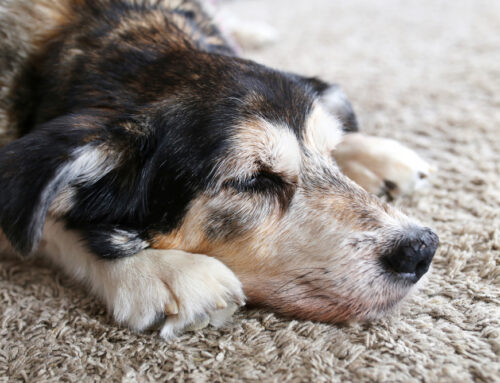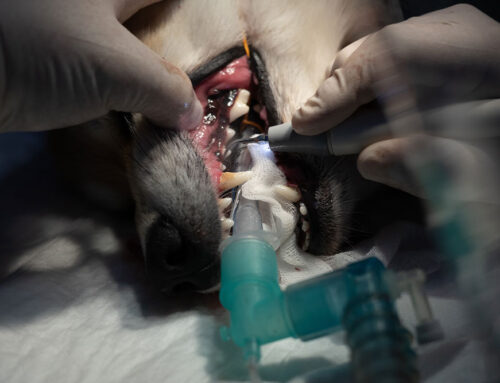Veterinary neurologists are specialists who often consult with general practitioners regarding their patients’ neurologic and related muscular conditions. VESPECON clients have access to our team’s neurology experts for virtual consultation on tough cases and for patients who cannot travel to a referral center. Meet VESPECON veterinary neurology specialist Dr. Johnny “Randy” Cross.
Veterinary neurology: A day in the life
Veterinary neurologists treat neurologic and related muscular conditions in dogs, cats, horses, and other animals. Most work in large multispecialty hospitals or academic settings, seeing patients, teaching students, interns, and residents, and contributing to neurology research. Throughout their day, a neurologist may do the following:
- Examine new and recheck patients.
- Consult with other departments, including the ER and ICU, providing neurology expertise in complex cases.
- Order and interpret advanced imaging studies, including MRIs and CTs.
- Perform advanced diagnostics, such as spinal fluid evaluation or nerve conduction tests.
- Perform neurologic and orthopedic surgeries.
- Manage epileptic patients.
What conditions does a veterinary neurologist treat?
Neurologists focus on nervous system conditions, including the brain, spinal cord, peripheral nerves, and neuromuscular systems. The conditions most commonly referred for veterinary neurology treatment include the following:
- IVDD
- Congenital or developmental anomalies (e.g., Chiari malformation)
- Epilepsy
- Tumors
- Inflammatory diseases (e.g., meningitis)
- Myasthenia gravis
- Degenerative myelopathy
- Traumatic injuries
Dr. Johnny “Randy” Cross: Questions and answers
Get to know our VESPECON team neurologist Dr. Cross. Read his answers to our questions.
Question: Where did you complete your veterinary education?
Answer: I completed my veterinary degree at Virginia-Maryland Regional College of Veterinary Medicine, Blacksburg, Virginia. In addition, I completed a rotating small animal medicine and surgery internship at Red Bank Veterinary Hospital, Tinton Falls, NJ, and a neurology residency at the University of Pennsylvania, Philadelphia.
Q: Where are you from, and where do you currently live?
A: I was born in Raleigh, North Carolina, and moved to Blacksburg, Virginia, when I was 5 years of age. I lived there through primary school, went to undergraduate at Virginia Tech, then completed my veterinary education. After my internship and residency, I moved to my first and only job in Carmel, Indiana, at VCA Advanced Veterinary Care Center.
Q: Why did you choose to pursue a veterinary specialty?
A: I love that neurology combines medical neurology, surgical interventions/treatments, and diagnostic imaging, especially with MRI. I also liked working at a facility in which each person has their niche and specialty, and we all collaborate to benefit a patient and their family.
Q: What do you enjoy most about veterinary neurology?
A: Helping paralyzed dogs walk again. Even after being in the profession for 12 years, the feeling I get seeing a previously lame dog walk is the best.
Q: What has been your most fulfilling or interesting case as a veterinary specialist?
A: One particular case has stayed with me since my early career. I debulked an intracranial meningioma, and the patient didn’t achieve the long-term survival for which we had hoped. The family’s son had a disability, and this dog was his world. This situation constantly reminds me that we have to fight hard for our patients’ recovery. Their wellbeing is their human family members’ utmost concern.
Q: How did you come to work with VESPECON?
A: I met the wonderful VESPECON team in the exhibit hall at a Western Veterinary Conference. Their energy, passion, and genuine kindness attracted me to their mission.
Q: How does working in neurology through VESPECON benefit or help general practitioners?
A: I enjoy collaborating with general practitioners, consulting on their cases but also educating them in neurology and neurosurgery. A limited number of specialists are out there, and our general practitioners are managing many more of these cases than we could possibly see. The more I can help them learn, the more patients and families benefit.
Q: Tell us about your two- and four-legged family members.
A: My wife is a small animal veterinary general practitioner. I think this helps keep me aware of general practitioners’ challenges. We have two daughters about to enter their teen years, two dogs, a three-legged cat, and five horses.
Q: What do you like to do in your spare time?
A: I like to read nonfiction and historical fiction novels. In addition, I like to exercise.
Q: Do you have any interesting hobbies or special talents?
A: I have an undergraduate minor in entomology, which also allowed me to have my own bee hives for a couple of years. Other than that, I am pretty ordinary.
Q: Where is the most interesting place you have traveled? Any specific destinations on your bucket list?
A: I spent two weeks in Kenya for a leadership-building experience during undergraduate school. Iceland, Japan, New Zealand, Argentina, and Thailand are on the bucket list.
Consult with Dr. Cross and our other veterinary specialists through our virtual VESPECON platform. Contact us to sign up, and through consults with our experts, you can advance your skill set and knowledge to start offering your patients the highest standard of veterinary care.







Leave A Comment